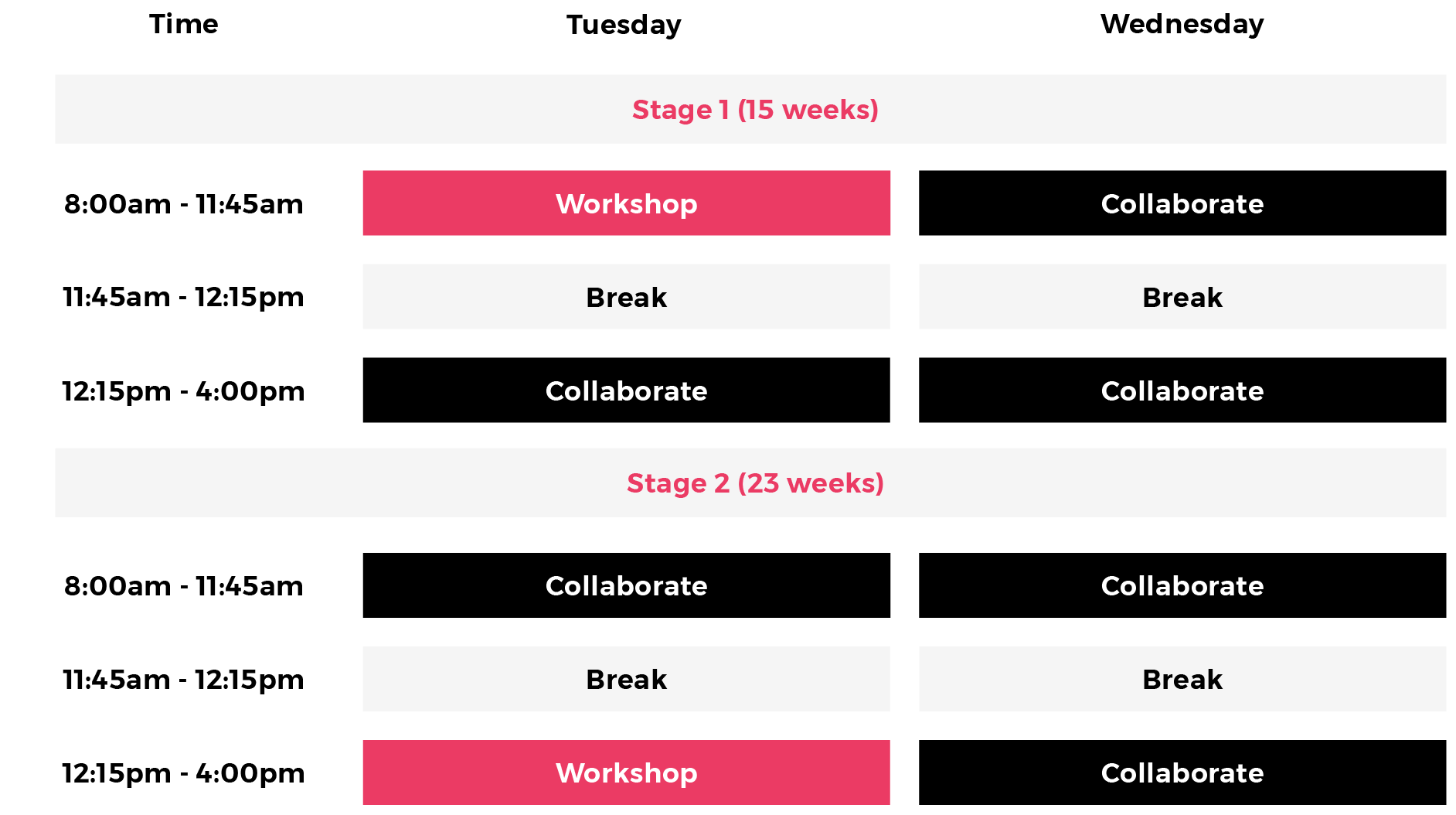CUA50920 Diploma of Photography and Digital Imaging
CRICOS Course Code: 106532B


Shift your passion for photography to a career or business with the Diploma of Photography and Photo Imaging. Unlock your creative potential and develop advanced photography skills to produce a professional body of work. Explore genres of photography including Fine Art, Portraiture, Documentary, Landscape and Commercial. You will learn studio and natural lighting techniques and will gain an understanding of operating and marketing your own photography business. Work in an inspiring and collaborative environment to develop your professional portfolio in preparation for prospective employers and/or clients.
![]() Monthly
Monthly
![]() 58 Weeks
58 Weeks
Study: 42 weeks // Supervised Study: 4 weeks // Holidays: 12 weeks
![]() Face-to-Face
Face-to-Face
15 hrs / week
![]() Distance
Distance
5 hrs / week
![]() Freelance Photographer // Photography Store Manager
Freelance Photographer // Photography Store Manager
![]() Campus
Campus
Gold Coast
Academic Entry Requirement:
Students must provide evidence of successful completion of:
Please note: home country evidence is accepted and must be translated
English Entry Requirement:
Students must pass a minimum of one of the following English Requirements:
Please note: All English evidence provided must be within a 2 year validity period. Either within two years before the application is made, or within two years of the visa grant
Course Resource Requirements:
The following resources are required to complete this course:
Visit https://helpx.adobe.com/photoshop/system-requirements.html
Please note: students are required to purchase these items at their own expense
Course Entry Requirement:
Students are required to submit photo images and complete the Entrepreneur Image Questionnaire to demonstrate introductory level technical skills in using the features of a DSLR camera
You may be eligible for Credit Transfers if you hold the same unit(s) from another provider. To be eligible; you must present your certified qualification at enrolment stage, together with the completed ‘Course Credit Form’. Once assessed, you will be notified of the outcome. Should your achieved units be equivalent, your CoE/course duration will be reduced according to the amount of time needed to complete the outstanding units.

BSBCRT413 Collaborate in creative processes
CUAPHI522 Plan and produce stock photo images
These units will give you the knowledge to be collaborative in the workplace using creative processes and the ability to produce photo images that may be used as stock photos for commercial use
CUAPHI531 Apply visual communication theory to photo imaging practice
CUAPHI532 Research and apply photo imaging trends and emerging technologies
Learn how to produce creative and innovative photo images based on visual communication theory. Investigate photo imaging trends and emerging technologies and assess their creative and commercial applications.
CUAPHI523 Employ colour management in a digital imaging workplace
Learn how to manage the integrity of colour across digital imaging devices. Research principals and techniques for control of digital colour and apply, review and update colour management strategies.
CUAPHI535 Produce commercial photo images
Learn how to establish a contract for a commercial photoshoot, prepare, shoot and produce images, wrap up and review the shoot.
CUAFIM511 Source funding for projects
Learn how to source money for creative or artistic projects. In this unit you will investigate, develop and pitch a funding proposal.
CUADIG518 Refine digital art techniques
Learn how to refine digital media techniques and develop your own digital art style in a body of creative work. Research, refine and evaluate your techniques encompassing animation, video and sound production.
CUAPHI533 Explore and apply photo lighting techniques
Research light and its relationship to photo imaging in this unit by experimenting with light for complex subjects and applying lighting to create image mood on various subjects.
BSBMKG546 Develop social media engagement plans
Learn how to develop a social media engagement strategy and facilitate content development and delivery. Monitor and evaluate engagement levels using analytics and report on engagement effectiveness.
CUAPHI536 Provide photographic portrait services
SIRRMER008 Plan and style merchandise photoshoots
This cluster of units will show you how to plan & style a photo shoot according to a brief and give you confidence to produce professional portrait images in key moments, moods and events.
CUAPHI537 Produce media photo images
Learn how to interpret editorial team assignments, work with journalists and liaise with public safety services and the general public. Produce illustrative images that communicate concepts, ideas and factual information in ways to evoke emotive responses in the viewer.
CUAPHI521 Make illustrative photo images for publication and display
Get creative and learn how to produce illustrative images that communicate concepts, ideas and factual information to evoke emotive responses in the viewer.
CUAPPR414 Develop self as artist
CUAPPR616 Extend expertise in a specialised art form to professional level
CUAPPR513 Present a body of own creative work
Unleash your creative self and refine your skills, develop you own style and evaluate your work. In this unit you will develop a cohesive body of work, seek and apply constructive feedback from others and adjust work processes and practice to improve technical, conceptual and commercial outcomes.


Please note; timetables are subject to change.
Workshop (stage 1)
During this time your mentor will deliver planned training sessions which are aimed to give you introductory photography skills. Activities may include presentations and planned activities to learn how to use cameras and photography tools.
 
Workshop (stage 2)
Upon completion of the introductory workshops, you will be equipped to commence more skilled project work. This scheduled time will focus on individual components of your assigned projects.
Collaborate
In collaboration with your peers, you will complete your assigned projects and assessments. In this allocated time slot, you will have meetings with your team to evaluate your project work and photography skills.
Canvas (Learner Management System)
Canvas is your online learning portal. Within this platform, you will be able to access your course learning materials, assessment requirements, and marked submissions. You will also be able to communicate with your Mentor within this platform, outside of timetabled hours. The system is user friendly and will help keep you on track throughout your studies.